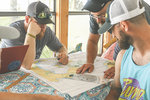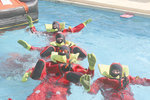Clear, 60° F
When Carl Christensen came home from piloting nuclear submarines overseas, his service didn’t end. In some ways, it had just begun.
Wanting to continue serving his country, the Navy …
This item is available in full to subscribers.
The Powell Tribune has expanded its online content. To continue reading, you will need to either log in to your subscriber account, or purchase a subscription.
If you are a current print subscriber, you can set up a free web account by clicking here.
If you already have a web account, but need to reset it, you can do so by clicking here.
If you would like to purchase a subscription click here.
Please log in to continue |
|



When Carl Christensen came home from piloting nuclear submarines overseas, his service didn’t end. In some ways, it had just begun.
Wanting to continue serving his country, the Navy veteran has enlisted in a different type of service — bringing awareness to the mental health needs of soldiers.
“I’m a veteran that feels I haven’t done enough and wanted to do what I could to help out,” he said.
Christensen knows firsthand the struggle of transitioning from active duty to small town life. So the Powell resident joined a team of veterans known as Fight Oar Die, entering a 3,000 mile journey across the Atlantic Ocean in a row boat. The Talisker Whisky Atlantic Challenge is billed as the toughest race in the world.
After enjoying a Thanksgiving meal with his family, Christensen will head to the Canary Islands, just off the coast of the African continent. There, he and his team members will load their row boat with 60 days of dried foods and set a course for Antigua in the West Indies.
About 30 teams made of members from all walks of life, will compete in the race, often for charities. Once underway, rowers find themselves left with their thoughts, the seemingly impossible expanse of the Atlantic and the job of getting the boat safely to the other side. Day after day the team will row for three hours and then rest for three, rain or shine and day and night, Christensen said.
Many have struggled with the race, but the Powell veteran feels he’ll handle the mental and physical stress in tight quarters well. His duty aboard a submarine for 13 years has uniquely prepared him for the task, he said. And his current job building irrigation pivots plus additional training has kept him in top shape.
“It’s going to be hard, but I have some grit behind me,” he said. “I’m a little worried, but it’ll be fine. It’s a good boat.”
The team’s boat, called Woobie, is 28-feet long. There’s no bathroom — just a bucket — and the team members will eat, sleep and share the space without break until finishing the race. “It’s going to be tough,” Christensen said, “but it’s an epic adventure at the same time.”
The struggles aboard are immense, but the hardest part for Christensen will be missing his wife Heather and his daughters, 11 year-old Patricia and 8 year-old Lynea. His daughters were too young to understand his being gone while he served. “They say they’ll miss me, but I’m trying to demonstrate what deployment life is like. I’m only going to be gone for a couple months,” he said. “I’ve tried to explain to them that some parents are gone for a year or more.”
Physically and emotionally tough
Powell’s Chris Kuntz was on the team last year and is familiar with “the daily grind” of the race. The 2018 team finished the race in 54 days. Four shifts a day of rowing were followed by attempts to rest during off time. “Sometimes you could sleep,” Kuntz said.
Other times all he could do was try to relax, listening to music or books on the iPod. Kuntz was a ranger in the U.S. Army and later joined the special forces. He compared the race to training he received.
Ranger school lasted 72 days. He lived on one meal a day while training nonstop with little sleep in hostile environments — from the desert to the mountains and then to swamps and forests. “I’ve been pushed to my limit before,” he said.
But the daily grind of the race wears on you both physically and emotionally. Not everyone can handle it. “We had a crew member that broke early and broke often,” he said.
Kuntz did his best to help keep the team together. One of the hardest parts was fighting wind and current. “Sometimes you could go 14 miles in three hours of rowing. Other times you simply couldn’t move because of the current,” he said.
At the finish line Kuntz was asked if he’d do it again. He was the only one on his boat who said yes. He’s volunteered to be an alternate for the 2021-22 races.
“I enjoyed it,” he said. “When you see a whale on TV, it’s awesome. But it’s a completely different animal when you see it up close and personal. It was kind of like an Atlantic safari.”
Christensen wasn’t acquainted with Kuntz and had no knowledge of the race until joining in on Facebook last year to watch Fight Oar Die compete. He applied to be a team member when the group asked for volunteers after the race. His team isn’t seeking to set a record, but they hope to beat last year’s team. Christensen said he and his three veteran teammates hope to complete the race in 40 days; the record for the course is 33 days.
The team just returned home after a month of training in Mobile Bay, off the coast of Alabama. There they rowed for 12 hours a day in preparations for the Talisker Whisky Atlantic Challenge. Getting the time off to train and race is hard for most people, but Christensen works hard in the spring — often putting in more than 80-hour weeks — so his employers are happy to let him have this time.
The mental and physical endurance will result in a life-changing achievement that will never be forgotten, race organizers promise. Hopefully, bringing awareness to the mental and emotional needs of service members through publicity for the team will give the issue a boost.
“If I’ve helped one person, it was all worth it,” Kuntz said.
Crew to be studied
While bringing awareness to mental health issues of military members is the goal, the team will also be providing psychologists with a chance to study the effects of the race. Rowers meet with psychologists several times before and after the race for evaluation; Christensen will have two discussions with Mike Vollmer, a veteran and a graduate student at the University of Denver, during the race.
“A lot of psychology falls under a single roof of clinical psychology. Recently the military identified shared interests in attacking many of its mental health issues,” said Vollmer. “This gives us a chance to study the unique stressers military members suffer.”
The University of Denver is one of only a handful in the nation that studies specific psychological issues of service members, Vollmer said. By concentrating on specific populations (like service members or athletes) psychologists can be more exact than through general clinical sessions, he said.
Results of studying the team — which may be a multi-year effort if funding can be found — will help understand issues as doctors track the rowers for months.
Kuntz also went through discussions at the University of Denver but isn’t part of the study as defined by Institutional Review Board parameters, being part of “a beta run for the research,” Vollmer said.
Vollmer has confidence in Christensen’s chances of doing well in the race.
“As individuals, they all have unique advantages — particularly strength,” Vollmer said. “Carl [Christensen] is extremely strong, used to be an officer aboard a sub, and is comfortable in high stress situations in a very confined space. When stuck on a rowboat, Carl will perform. And his calm will breed more of the same.”
After graduation, Vollmer plans to return to active duty as a psychologist. He also wants nothing more than to give back to his country through service.